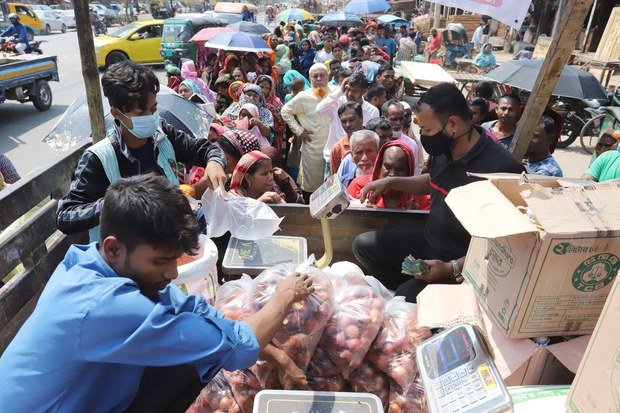Amid Ukraine war, Bangladeshis fret about higher food prices
2022.03.14
Dhaka
 Bangladeshis line up to buy onions from a Trading Corp. of Bangladesh mobile stand in Dhaka’s Mirpur area, March 6, 2022.
Bangladeshis line up to buy onions from a Trading Corp. of Bangladesh mobile stand in Dhaka’s Mirpur area, March 6, 2022.
Bangladeshis are feeling pinched by rising prices for food and vegetable oil ahead of Ramadan, which usually sees a surge in shopping, with consumers complaining that merchants are using the Russia-Ukraine war as a pretext for hiking prices.
Bangladesh imports two-thirds of its wheat from Russia and Ukraine – the price of the grain and other edibles have increased from levels before Russian President Vladimir Putin ordered military forces to attack and invade the country next-door on Feb. 24.
“We are highly worried about the Russia-Ukraine war. There is a fear of chaos in the food market,” Commerce Minister Tipu Munshi told reporters during a news conference at his office on Monday.
“Most of our wheat is imported from Ukraine. If the Russia-Ukraine unrest is to linger, it will be a matter of great concern.”
On Monday, Prime Minister Sheikh Hasina and her cabinet directed the National Board of Revenue (NBR) to cut the value-added tax (VAT) as much as possible among imports of essential commodities, including cooking oil and sugar.
The board waived the 20 percent VAT on soybean oil until June 30, but kept the existing 15 percent VAT on the import of other cooking oils, according to a document signed by board Chairman Abu Hena Md. Rahmatul Muneem.
Russia launched its invasion of Ukraine in the weeks before Muslims across the globe are preparing for their month-long holy month of fasting. Ramadan will begin in early April, and the month’s official start is determined by the sighting of the new crescent moon.
“There is a tendency among Bangladeshi businessmen that they want to make a profit for the whole year in just one month of Ramadan. As a result, the prices of daily commodities increase before the month of Ramadan every year,” Ghulam Rahman, president of the Consumers Association of Bangladesh, told BenarNews.
“This year the Russia-Ukraine war added a new hardship for consumers,” he said, adding, “Traders are hiking the price out of fear and to make some extra profits.”
Food Minister Sadhan Chandra Majumder said deputy commissioners and local officials have been told to take action against traders who attempt to horde supplies to raise prices.
One food shopper questioned the source of the price hikes.
“Vendors are saying that the prices have been increased due to the Russia-Ukraine war. But I do not understand why they give such an excuse while the war began just three weeks ago and every shipment of imported items takes at least three months to arrive in Bangladesh,” Shairful Islam told BenarNews while shopping at the Kawran Bazar.
Price hikes
Almost all commodities have increased by at least 3 percent and up to more than 53 percent for onions, a staple in the South Asian country, according to the Trading Corp. of Bangladesh (TCB).
Small retailers said they were being forced to pass on rising prices to their customers.
“The prices of wheat and cooking oil had slightly increased before the war started – but those prices suddenly jumped on the day the war began,” Subal Saha, a retailer in the Mirpur area of Dhaka, told BenarNews.
He said a kg of flour (2.2 lbs) sold for 32 taka (U.S. 37 cents) about six weeks ago, now sells for 45 taka (52 cents). A five-liter (5.3-quart) bottle of cooking oil sold for 600 to 620 taka ($6.96 to $7.19) about a month ago now sells for 800 taka ($9.28).
Masud Rana, a small trader at the Kawran Bazar market, sold onions for 30 taka (35 cents) about six weeks ago, but he is selling them for 50 taka (58 cents) while others are selling for 55 taka (64 cents).
The owner of a flour mill said he and others are forced to purchase at higher prices.
“Importers used to purchase a kg of wheat for 28 taka (33 cents) from Ukraine and up to 27 taka (31 cents) from India,” Nahiduzzaman Nishad, owner of Nishita Flour Mills in Bogura, told BenarNews.
Meanwhile, a former vice president of the Federation of Bangladesh Chambers of Commerce and Industries said those who want to say that the war in Ukraine has not affected prices in Bangladesh are wrong.
“Of course, it has affected the market,” Md. Helal Uddin told BenarNews while questioning the government’s actions.
“Our market management and price review process have serious flaws. Authorities are blaming the business community or business people without addressing the flaws. At the end of the day, the government and opposition are raising fingers against business people.”







